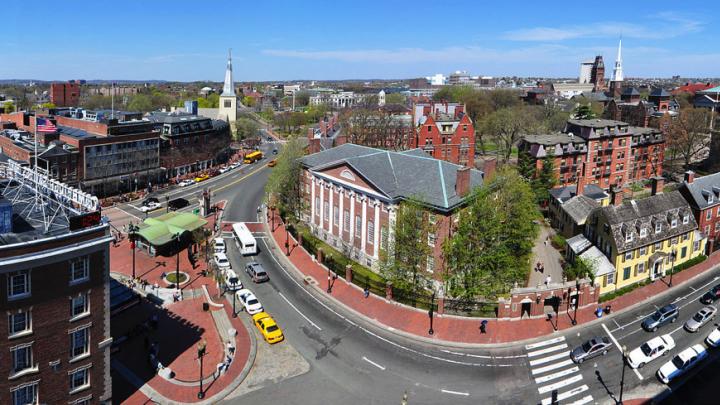On March 25, Harvard Square will bid a final farewell to Schoenhof’s Foreign Books. The 150-year-old bookstore currently lives on Mount Auburn Street, and rents its basement storefront from the Spee Club. Daniel Eastman, director of sales and marketing, told The Boston Globe that the club “has been really kind with us. This should have happened three years ago, but they tried really hard to find some way to help us stay.” The demise of Schoenhof’s, the largest brick-and-mortar retailer of foreign-language books in North America, is more than just a blow to wistful world travelers and language learners; it’s a loss for the Harvard community, which similarly lost The Globe Corner Book Store, one of the largest map and travel-book retailers in the country, to untenable rent increases in 2011.
In the final weeks of Schoenhof’s physical presence in the Square, other local independent booksellers face mounting rent prices, a shift in book-buyers’ purchasing behavior, and, most notably, tough competition from the Harvard Coop, which came under the management of corporate giant Barnes and Noble roughly two decades ago. For niche book lovers, Grolier Poetry Book Shop is an unmissable gem—it boasts a collection of more than 15,000 volumes and has a history of hosting celebrated names like e.e cummings ’15, T.S. Eliot ’10, Litt.D. ’47, and Marianne Moore. Ifeanyi Menkiti, who purchased the store as it was teetering on the edge of bankruptcy in 2006, says, “For us, it was all about this place and its history. It would be a shame to lose this culture. I’m from Nigeria, where history and culture matter.” Menkiti is professor emeritus of philosophy at Wellesley, and cites the income stability of teaching as a key reason why he and his wife felt able to take on the responsibility of running Grolier in the years it was struggling to stay afloat. “It is a labor of love,” says Menkiti. He remembers recently hosting a teenager from Newton-North High School who spent hours reading and laughing while perusing the shelves of the bookstore. The sense of fulfillment derived from seeing young people continue to discover and enjoy poetry sustains Menkiti’s mission to share Grolier’s collections with audiences who journey from across the country or across Harvard Yard to read the volumes he has available.
Just around the corner, Harvard Book Store offers ample reading material, both new and used, to patrons seeking a more generalist selection. Jeff Mayersohn bought the store at the end of 2008, “probably at the worst possible moment to buy a bookstore,” he says, referring to the economic turmoil in the United States at the time. Yet running a bookstore was a long-running dream, and Harvard Book Store was up for sale just around the time he was ready to retire and turn to a new project. Like all independent booksellers across the country and in Harvard Square, Mayersohn admits that the rise of online retailers like Amazon has posed a serious challenge for business, but explains how he found a silver lining: “People were lamenting the digitization of books as the end of the brick-and-mortar book store, but I saw it as a huge advantage. With the cloud, we had access to the same books that massive corporate book stores did.” To this end, Harvard Book Store is home to an Espresso book machine, which offers patrons the opportunity to print books on demand, including their own works. In addition to offering print services, Harvard Book Store holds betweetn 350 and 450 author readings each year in order to drive business to the store and combat steadily rising rents. Both the Harvard Book Store and Grolier rent from the University itself, and Mayersohn says Harvard has reassured his staff of its commitment to protecting brick-and-mortar businesses in the Square.
For John Petrovato, who has run Raven Used Books for roughly 20 years, the rent increases in Harvard Square have been something of a blessing in disguise. After Raven moved from its pricey basement location on busy JFK Street to a cheaper spot on Church Street, sales have been up and foot traffic has been higher than ever. “For what we do, the Square is the best place in the country we could be,” he says. Raven’s shelves of used books serve students, faculty members, and tourists looking for a brick-and-mortar shop that can match Amazon’s bargain prices, a luxury that places like Schoenhof’s and other new-book sellers don’t have. Petrovato explains that the prohibitive cost of retail space in the Square will continue to shape the kinds of stores that open there, citing prominent real estate that has gone to corporations like CVS and Urban Outfitters instead of small businesses. “World-class bookstores are trying to get into Harvard Square, and they just can’t afford the rents. Since I’ve been here, there’s easily been an increase of three to four times.”
Perhaps somewhat ironically, Schoenhof’s will continue to serve readers online, putting a medium that played a critical role in the store’s demise to good use in this next stage of the business. Its decision echoes steps considered by old Harvard Square mainstays like WordsWorth Books, which went out of business in 2004 and similarly considered taking its business online, only to fail to do so. For the time being, the best way for the Harvard community to help local booksellers may be to spend a peaceful afternoon perusing their shelves, instead of quickly typing a title into an Internet browser.








